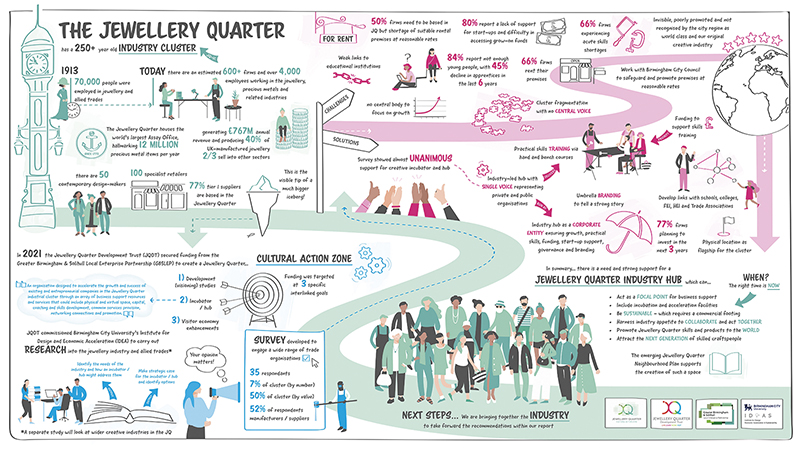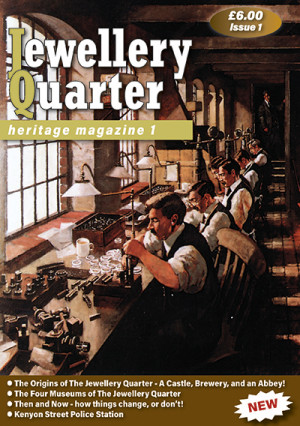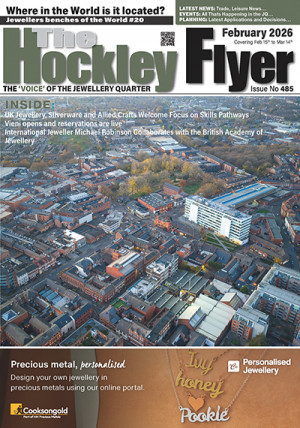 A major study by the Jewellery Quarter Development Trust and Birmingham City University supported by Greater Birmingham & Solihull Local Enterprise Partnership identifies an urgent need to tackle practical skills, business support & resources, and strong promotion.
A major study by the Jewellery Quarter Development Trust and Birmingham City University supported by Greater Birmingham & Solihull Local Enterprise Partnership identifies an urgent need to tackle practical skills, business support & resources, and strong promotion.
With a rich 250+ year history, the Jewellery Quarter is responsible for producing 40% of the UK’s jewellery and precious goods, generating an estimated £767m of annual revenue for the city’s economy. The world’s largest Assay Office, hallmarking more than 12 million precious metal items each year, is also located here.
The creation of an Industry Hub comes after an extensive research project led by IDEAS at Birmingham City University. The research surveyed jewellery and allied businesses within the Jewellery Quarter and found that 80% of businesses reported a lack of support for start-ups and difficulty in accessing grow-on funds. Additionally, 84% reported not enough access to young people, with a 45% decline in apprentices in the last 6 years and 66% of firms experiencing acute skills shortages. The report also highlighted cluster fragmentation with no central voice. More positively, 77% of firms plan to invest over the next 3 years, and there was overwhelming support for a body to be formed that would help businesses thrive.
The hub is envisaged to be industry-led with the support of the Jewellery Quarter Development Trust (JQDT), Birmingham City Council (BCC), Birmingham City University (BCU), Goldsmiths’ Centre, National Association of Jewellers (NAJ), and the Greater Birmingham and Solihull Local Enterprise Partnership (GBSLEP). Initially it will provide a forum for networking, collaboration and identifying existing support available to businesses.
Beverley Nielsen, Associate Professor at the Institute for Design, Economic Acceleration & Sustainability (IDEAS) at Birmingham City University comments:
“The findings from our report clearly show that we have a world-beating creative cluster right in the heart of our city, with a proud heritage representing our original creative industry. Today, we’re still making prestigious jewellery, medals, regalia, and accessories purchased and treasured by people all over the world.
“We estimate the jewellery cluster consists of 600 firms employing around 4,000 people across a range of highly specialised professions. But the research shows that the cluster is in a perilous state.
Unless we can provide a steady pipeline of practical technical skills and new talent, facilitate access to the required premises, and promote a strong brand for our Jewellery Quarter industry cluster, it runs the risk of terminal decline.
“The good news is that there’s a significant appetite to address these challenges. This report calls for the industry, stakeholders, and educators to work together to ensure there’s a bright future for our precious jewellery cluster.”
Greg Fattorini, Managing Director of 196-year-old Thomas Fattorini Ltd comments:
“The Jewellery Quarter industry cluster is an internationally renowned centre of excellence and a hidden asset to the city and nation. To thrive, our industry needs to speak as a collective with a single voice which, with support from the city and other partners, can promote our wares to the world and attract the next generation of craftspeople. An industry-led hub can do this and much more, and the time to work together is now.”
Matthew Bott, Director of the JQDT, comments: “Jewellery and precious metal businesses and their allied trades are Birmingham’s original creative industry. Due to GBSLEP’s support, the JQDT has been able to identify the challenges of the industry and the solutions that will help it to thrive into the future. There is a clear appetite from organisations big and small, public, and private, to work together and address the issues and seize the opportunities in front of us. The Trust is committed to safeguarding the future of this industrial cluster and looks forward to participating in the working group.”
The plans for the Industry Hub form part of a wide-ranging ‘Cultural Action Zone’ project spearheaded by the JQDT and funded by GBSLEP. The project has already developed visioning studies for key parts of the Jewellery Quarter and supports turbo-charging the Jewellery Quarter’s place-branding through its built and industrial heritage, including making the business case for a Birmingham Jewellery Biennial.
The Jewellery Quarter Industry Hub is intended to be led by volunteer businesses from the Jewellery Quarter, who will take it forward and guide its development. By constituting the hub, the JQDT aims for businesses to become the primary driving force, with support from both the public and third sector.




